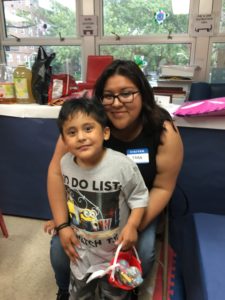 Growing up, things were tough. My parents are immigrants from Ecuador and worked where and when they could. For a lot of my childhood, my mom worked in a factory and my dad did construction. They’d come home at 7 or 8 o’clock, leaving my older sister and me alone. Sometimes I spent days in the library.
Growing up, things were tough. My parents are immigrants from Ecuador and worked where and when they could. For a lot of my childhood, my mom worked in a factory and my dad did construction. They’d come home at 7 or 8 o’clock, leaving my older sister and me alone. Sometimes I spent days in the library.
My older brother had stayed behind in Ecuador, and it was so tough on them to be apart from him like that, but then the unthinkable happened — he died. The family members in Ecuador who were taking care of him were very closed-mouthed about it, but they said he drowned. My parents never got over it, and it was the main event that impacted their whole lives. My dad had always been a drinker, but after my brother’s death, he became an alcoholic.
With my parents heartbroken and hardly around, my sister and I basically had to raise ourselves. No one was there to help me with my homework, or make sure I did it. They never attended my school plays or parent-teacher conferences. They did attend one conference, but because they don’t understand English well, I had to translate, and it just seemed like a waste of time.
Time was a weird factor in my childhood, with my parents having not enough of it and my sister and me spending too much of it alone. We became rebels. We started hanging out with what people call gang members, going out dancing with much older guys. I was 12.
My sister ended up pregnant at 13, and I wasn’t far behind.
While we were out dancing, I met my boyfriend, who was about 5 years older. We did everything together. After my sister had my niece, my mother stayed home to help take care of the baby, and she suddenly started taking notice of what I was doing. But it was too late. She set a curfew, which I ignored. She’d say, “Don’t you be like your sister,” and it annoyed me so much. I’d be like, “I’m not like her,” and just slam the door. I was working as a tutor, earning 50 dollars a week, which gave me a lot of freedom. I had a phone that I paid for myself and felt like I didn’t need anyone—anyone except my boyfriend, that is.
We broke up about a month after we started dating, and I was heartbroken. I couldn’t imagine life without him anymore. Being a girl who doesn’t have her mother’s or father’s care, I was trying to find love elsewhere. We got back together, and two months later, I was the one who was pregnant.
I cried day and night. I didn’t tell my parents until I was in my fifth or sixth month. When I finally told them, it was a whole big issue. The hospital called the Administration for Children’s Services and got an order of protection against my boyfriend. I was so used to seeing him every day, and now I couldn’t see him at all. I felt like I didn’t want my baby, because he was the one who’d taken my boyfriend away — if I hadn’t gotten pregnant, I’d still be able to see my boyfriend. That’s what I was thinking.
I was so depressed and wasn’t doing well, relationship-wise, with others. It was a dark time, but thankfully, I had The Child Center of NY to help me through it. My sister had been referred to the home visiting program when she started abusing alcohol after the birth of my niece. Her home visitor saw what was going on with me and thought I could benefit from the program, too. She was right.
My caseworker referred me to therapy with a Child Center therapist, Gisela, which helped a lot. I could finally communicate with someone who would hear me out without judging me. Being pregnant, and then a mom, so young, people look at you with this face, like, “Oh my God, she had a baby.” You feel so judged all the time. But therapy was a place where that wasn’t true. Therapy also helped me in every single relationship, because Gisela helped me learn how to talk things out and express myself.
The home visiting program also showed me that there was a whole world out there. My first home visitor, Ms. Cindy, took me and other kids in the program on trips. We really enjoyed ourselves. I’d never been to a theater or a multiplex, and when she took us, I was like, Wow. She took us to the boardwalk, to see the Manhattan skyline, Governor’s Island…. It was amazing.
Teen Time was another way I got to meet people the same age, interact with them, and have fun without being judged.
But one of the most important things The Child Center helped me learn was how to be a good mom to my son. I had my baby boy five days before my 15th birthday. He was born at 34 weeks and had a lot of medical issues. Eventually, it turned out he was having developmental delays, and in 2014, he was diagnosed with autism. I was heartbroken. I thought it was my fault and wanted to give up; I felt like I’d already failed as a parent. But my mental health worker, Ms. Brenda, explained that sometimes these things happen, and I was going to have to be mature enough and strong enough to deal with it for my son’s sake. She showed me how to research, fill out paperwork, and ask questions. I wasn’t the type of person to ask questions; I was the kind of person who wanted to pretend nothing was wrong. But Ms. Brenda helped me deal with my son’s diagnosis, and now I know how to advocate for him.
Even with all this going on, it was still important to me that I finish high school, and Ms. Brenda helped me transfer to a high school that had child care. It wasn’t easy being a mom, working, and going to high school, especially with all my son’s doctor appointments and his being sick a lot. But I did it: I graduated high school, and today I’m a student at Queensborough Community College.
I don’t know what the future holds, but I feel like it’s going to be big. I want to become an ultrasound technician, and I’m working toward my associate’s degree and training. I’m on track to graduate next year.
There were times I was going to give up on college, but Ms. Brenda pointed out to me, “Look how strong you are. Look what you’ve been through already — you were tough enough to get through that.” That’s stayed with me. I know I am that strong.
I like that I’m a good role model for my niece and nephews and my little brother. I can set an example for them and tell them to stand up for themselves. With my brother, I’m able to help him communicate with my parents, the way I learned how through the home visiting program. I had so much anger toward my parents; Ms. Brenda helped me see that I couldn’t change them, but I could learn to communicate with them, and ignore certain things when I needed to.
My son is five now. It’s tough to arrange everything, but I try to be consistent, stay involved in his therapy and education and go to all the parent-teacher conferences. I’m not afraid to ask questions.
Sometimes I get sad and wonder, “Why is my son like this?” This isn’t the way I wanted him to be. But then I remember to go forward. It may not be the way I wanted it to be, but I have so many more years to love my son. There were times I wanted to give up, but I’d think of my son, and I persevered for him. Someday I want to tell him that I achieved everything for him, and I want to give him a diploma one day. I see big things for him, too.
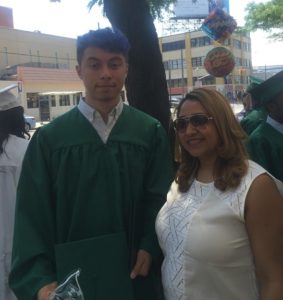
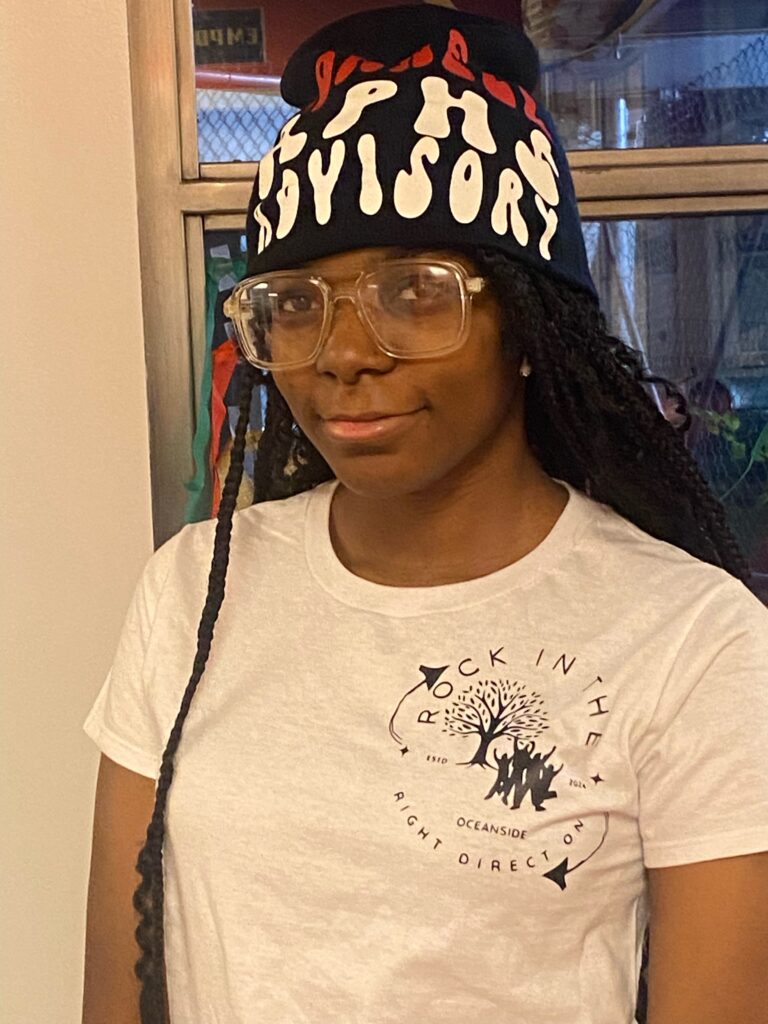
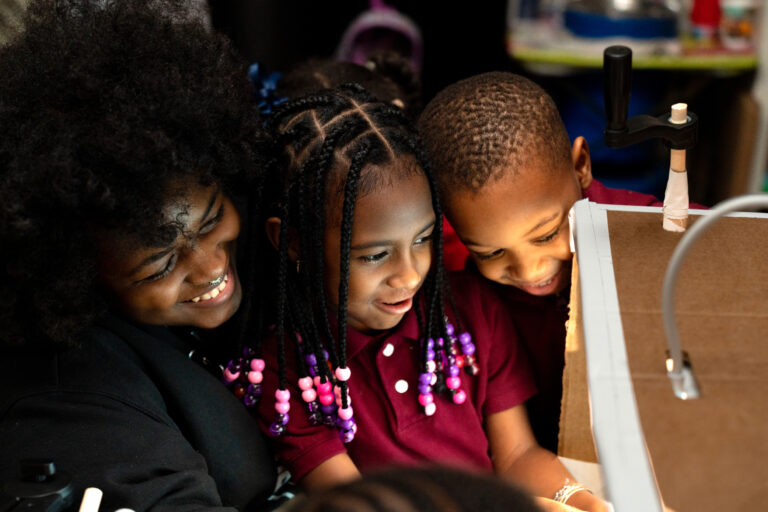

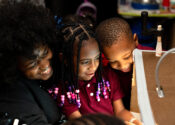


You must be logged in to post a comment.